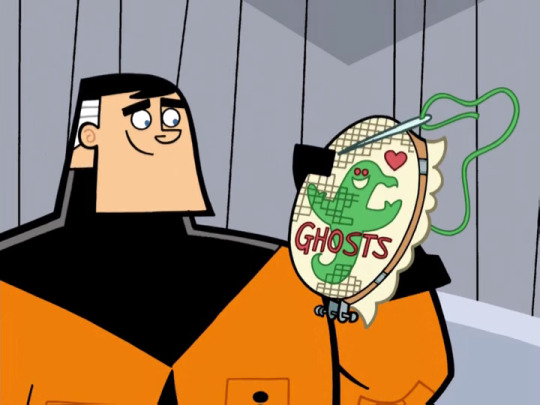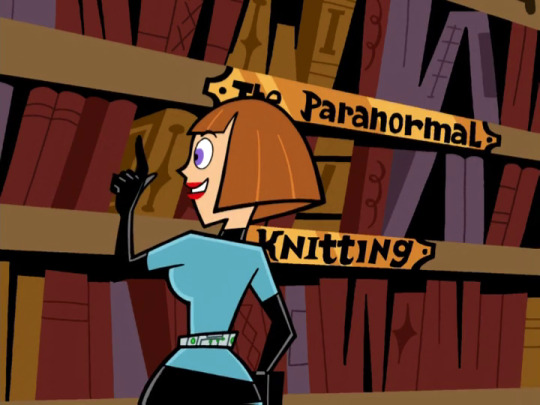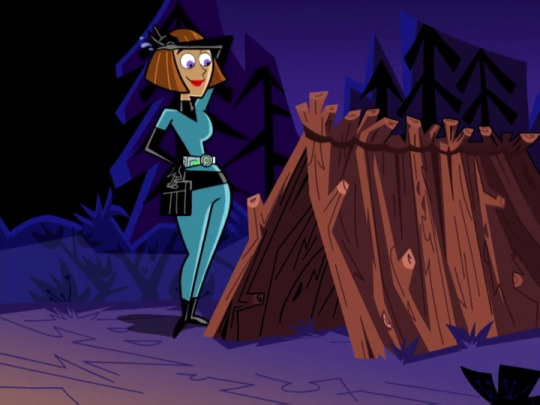#hobbies that buck gender norms too
Explore tagged Tumblr posts
Text
So
Jack does cross stitch

Vlad knits (pictured: his bookshelf)

And Maddie's into bushcraft

I just think that's neat
#danny phantom#vlad masters#jack fenton#maddie fenton#hjbedit#meta#idk what the point of this post is#maybe just celebrating that they all have hobbies outside of ghosts#hobbies that buck gender norms too#the crafty trio#i want a tv series set in the 80s about these three#nicktoons#nickelodeon
417 notes
·
View notes
Text
spongebob gender role commentary I did for a class discussion :)
The TV show I picked was (unsurprisingly) Spongebob Squarepants. Commonly shortened to just Spongebob, the animated TV series follows the famous yellow sea sponge Spongebob and his friends through various misadventures and scenarios. There is no overarching plot, though the series does have a few movie installments with solid, albeit completely unrelated, plots. (There's even a Spongebob musical! It's awesome, I recommend it!) Many of the episodes are quirky, colorful, silly, and sometimes outrageous. The show is rated TV-Y and recommended for children ages 7+. In short, however, Spongebob Squarepants is a bubbly young sea sponge who lives in a pineapple under the sea next to his best friend Patrick Star and reluctant neighbor and coworker Squidward Tentacles. Spongebob works as head fry cook at the most popular eating establishment in his hometown of Bikini Bottom, the Krusty Krab, owned and operated by Mr. Eugene Krabs, a notorious cheapskate. There are plenty of recurring characters as well, such as Mr. Krabs' archnemesis Sheldon J. Plankton, owner of the Chum Bucket, Plankton's computer wife Karen, Spongebob's pet snail Gary, Sandy Cheeks the Texan squirrel, and Mr. Krabs' whale daughter Pearl. Many of the episodes feature one or more of these characters and show them in a range of situations, from going to a school dance to covering up an accidental homicide. Overall, this show is definitely one that many of my friends weren't allowed to watch growing up because it was too weird for their parents to handle.
When it comes to gender stereotypes in Spongebob, I can proudly say that many aspects of the show defy gender expectations. (Perhaps that's another reason why many parents don't let their kids watch it!) To list a few examples, let's start with male characters with feminine characteristics. Spongebob as a character is not at all a depiction of traditional masculinity; he has big sweet eyes and little eyelashes, rosy cheeks, buck teeth, and a high-pitched voice (voiced by the iconic Tom Kenny!). None of these traits are consistent with the stereotypical strong, burly man often idealized by young boys. Spongebob is kind and loving to all, even to those who don't like him, like Squidward and Plankton. Spongebob's effeminate nature is never made to seem like a bad thing, though. Spongebob has worn a variety of flashy, feminine or gender nonconforming costumes that no one bats an eye at. (Like that one episode where he wears a little maid dress...yeah.) Another example of non-traditional masculinity can be seen in Squidward. Though not as outwardly effeminate as Spongebob, Squidward partakes in hobbies not typically associated with those of men. Squidward is a lover of the fine arts and music; he enjoys painting and playing the clarinet; he likes to pamper himself with rich sweets and cares a lot about his appearance. None of these things are explicitly feminine, though that's easy for me to say as someone who doesn't see things as gendered anymore. Traditionally speaking, these kinds of activities are often perceived as feminine, so to see a male character openly doing them is certainly a defiance of gender norms, especially for kids' TV.
Let's move onto female characters. Two female characters come to mind when thinking about gender in Spongebob: Sandy and Pearl. Sandy exhibits several traits inconsistent with those of female characters in children's media. For starters, Sandy is insanely smart; she's always depicted tinkering with robots and machines and gadgets. The show makes it clear that Sandy is among the smartest characters in the show, if not the smartest. Secondly, Sandy is strong and athletic; she loves karate and extreme sports, and has been depicted on multiple occasions partaking in dangerous, thrilling activities. There's a whole episode where Sandy makes Spongebob do extreme things with her, and it drives him to the point of exhaustion. Many of these traits are commonly associated with male characters, i.e. strength, smarts, and passion for dangerous activity. Sandy is never once depicted as weak or in need of saving; she's a strong, smart, independent southern lady who isn't afraid to throw down.
Next up is Pearl! I think Pearl as a character is wonderful because while she is quite feminine, she's not the typical depiction of a teenage girl. Pearl isn't small or frail; as a whale, she's tall, strong, and athletic (cheerleader!). Her voice is relatively deep, and despite her size and strength, she is still seen loving and indulging in girly things like clothes, jewelry, boy bands, and pink! I really like how Pearl shows young girls that you can be feminine even when you aren't the cookie cutter image of a young girl.
Finally, am I surprised by a lot of this? The answer: yes and no. Spongebob first aired in 1999 (over 20 years ago!) and a lot of the character portrayals are relatively progressive for its time. Subverting gender expectations has been a thing in children's TV for a while, but typically only with one or two characters. Spongebob makes no apologies whatsoever with its role reversals; boys can like girly things, and girls can like boyish things! It's honestly so impactful to me, especially since I grew up with this show (and the og Teen Titans, of course.) On the other hand, it's not so surprising, especially with a lot of the newer episodes (yes, it's still airing...) Much of the new Spongebob is outwardly non-stereotypical when it comes to traditional gender norms, and at this point, I can't say I'm surprised. Maybe it's because I've always loved this show and I'm biased, but a lot of the stuff in these episodes just makes perfect sense to me. I can definitely understand why parents wouldn't want their kids watching Spongebob, though. Challenges to gender norms scare some people, and considering America's history, that makes sense. I hope, going forward, that more kids will get to grow up alongside Spongebob and his silly antics so that they too may grow into the mindset that gender is a social construct, and you should do whatever makes you happy.
4 notes
·
View notes